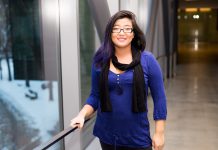UW will welcome the first sponsored Syrian refugee to join our campus in Fall 2016. </p>
Each year since 2006, St. Paul’s College has sponsored one or two students as a part of their Student Refugee Program (SRP). UW has also accepted students from refugee camps in Kenya and Malawi.
According to Alana Meier, local chair of the World University Service of Canada (WUSC), for a traditional applicant, the waiting process can be quite lengthy. In order to be successful, applicants must excel academically but also be heavily involved in their community. WUSC connects students from refugee camps with Canadian post-secondary institutions.
“Besides the simple things like [attending] high school graduation, a lot of these students [have] spent a great deal of effort building up their resumes,” Meier explained. “So students that have engaged within their communities, within the school, [and] excelled in grades, of course a prerequisite is that they are living within a refugee camp for at least a year before they come.”
In addition, applicants must further provide documents such as health checks and a criminal record check. As a student part of WUSC, the former refugee becomes a permanent resident of Canada and the first two years of their education, including accommodations and living expense, are paid for.
Oswald Mugisho Buhendwa is a third-year philosophy and political science student who joined UW in 2013 as a part of the SRP. Before his birth, his parents fled to Kenya after a war broke out in Congo. Born in Kenya as a Congolese citizen, Buhendwa was considered a refugee.
After high school, and while working with the Lutheran World Federation at a camp in Nairobi, he applied to WASC and was accepted at UW.
“It wasn’t terrifying … you’re just told that you’ll meet someone once you land but you’re not sure if you’ll meet that person,” said Buhendwa “So [there’s] some anxiety in that you don’t know where you’re going. Plus, you’re travelling alone.”
Buhendwa explained that the waiting period can often be lengthy and emotionally taxing. Medical tests, such as tuberculosis, can be drawn-out. If you have exposure to the disease, you may need to wait six to 12 months and cannot be relocated until it is dormant.
“If you don’t have the correct documents or the names don’t fit in all the documents right … they question who you are and you need to keep providing more documents until they’re certain,” he said. “And all this time you just spend in the camp.”
Meier’s role as chair is to bridge the gaps that students may experience, in terms of culture shock, making friends and connections, as well as general mentorship. For the incoming Syrian student, the transition to life at UW may be challenging.
“Often times [sponsored students] are linked up from the same camp so they knew each other years ago or they have a similar experience and they can relate,” Meier said. “As a Syrian student they are coming in with a completely new set of needs.
“A Syrian student could be coming with a partial university education, had to flee, or relocate for a separate reason. It’s a completely different set of needs…. It’s important to link up with new services that we haven’t had before because it’s a new set of needs now,” Meier continued.
“It’s a huge issue that has to be addressed and I think it has to be accounted for and followed this coming year because that Syrian student may not feel that same connection to past year students.”





























